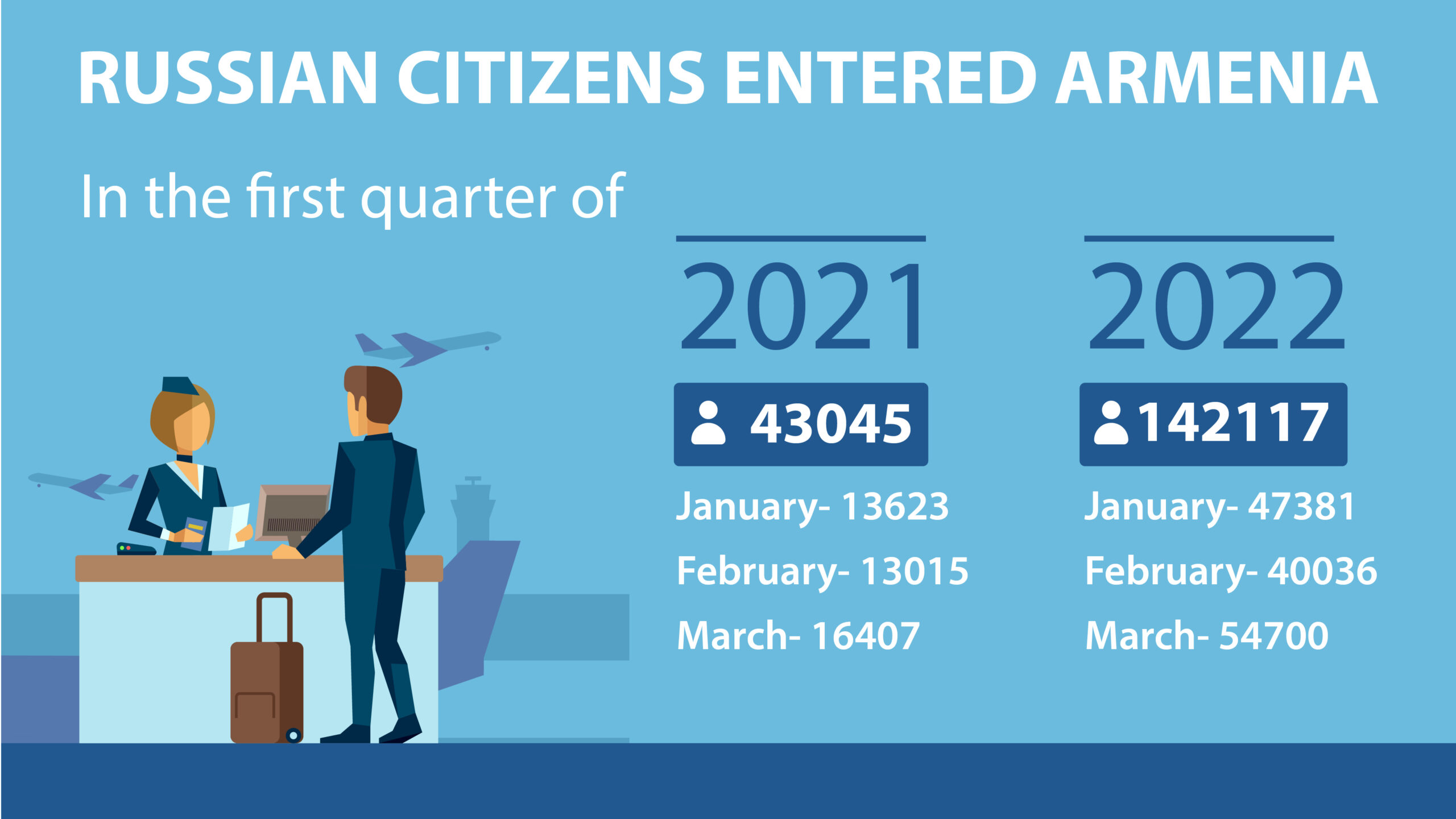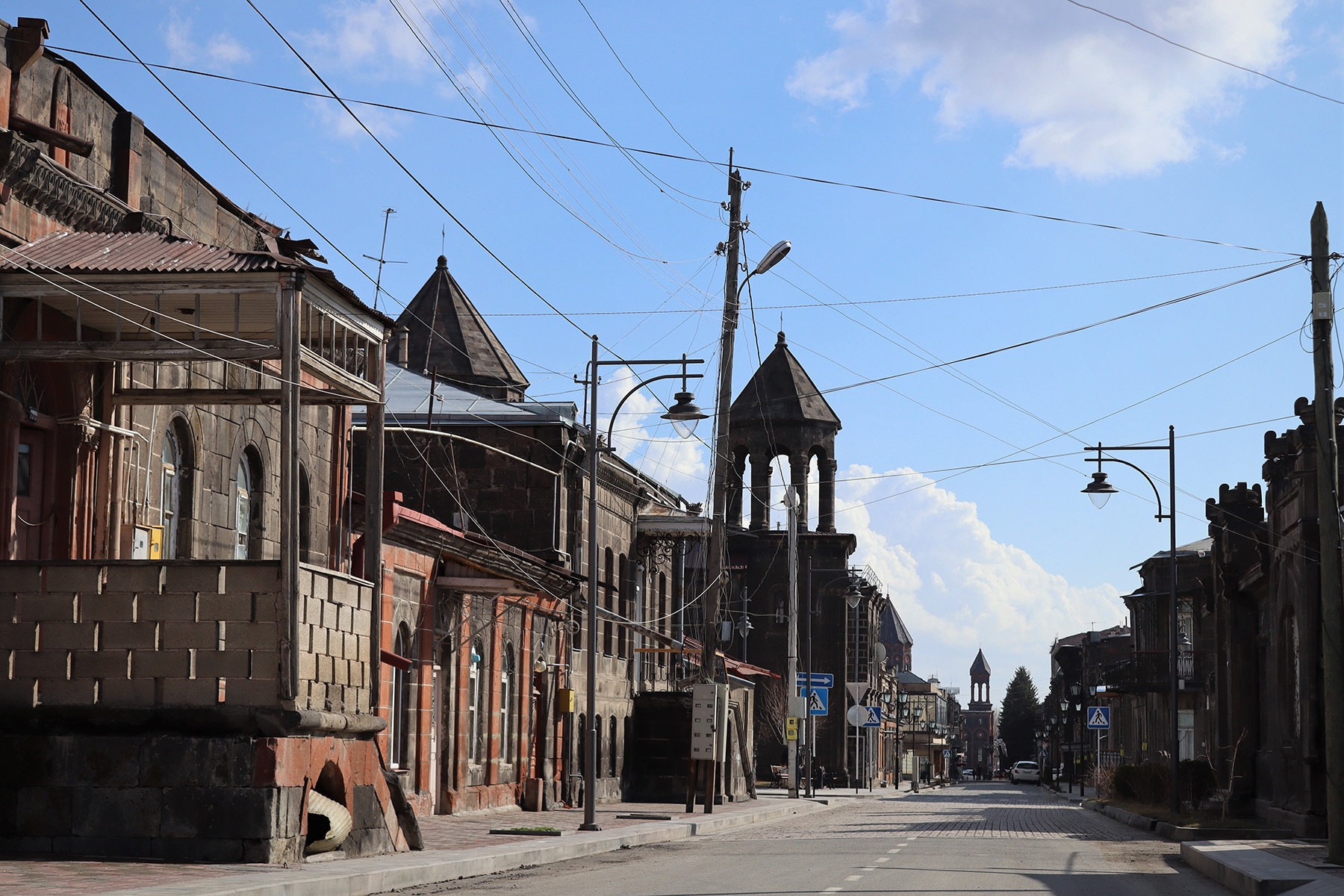
The war in Ukraine drove tens of thousands of Russian citizens to relocate to Armenia. While most have settled in Yerevan, high rents in the capital have pushed some to seek out other options.
Since the start of the war, Yerevan’s Zvartnots International Airport has been as busy as ever; incoming flights, however, don’t only bring in tourists who want to relax in the picturesque mountains of Armenia, but also thousands of Russians who intend to settle in the country.
According to official numbers, around 142,000 Russians crossed the border during the first quarter of the year — a significant jump from the comparatively paltry 43,000 recorded in the same period last year.

Some of those who come return after a while, and others use Armenia as a transit country to circumvent direct flight bans to and from Russia, but tens of thousands choose to stay.
Vitaly Sitsin, a 48-year-old programmer by profession, moved to Yerevan from the Russian city of Perm two months ago.
‘Our company closed [in Perm] and moved to Yerevan. I am gradually adapting to life here’, Vitaly told OC Media.
Vitaly’s employer rents an apartment for him and his coworkers who have temporarily settled in the Armenian capital. He said his rent exceeds $1,000 a month, and he is happy that he is not the one paying it. Rents for some apartments in the Armenian capital have doubled since the war broke out on 24 February.
[Read more on OC Media: Evictions surge as rents skyrocket in Yerevan and Tbilisi]
‘I have many friends who moved to Armenia like me, but not all of them stayed in Yerevan’, the programmer said. ‘Many prefer to move to other cities where life is relatively affordable.’
One such city is Gyumri, the second-largest in the country with a population of 100,000. Developed and affordable, it has become the go-to for those who have been priced out of the country’s capital. Even Vitaly has been mulling moving there if he decides to stay in Armenia longer, he said.
‘We love this city’
Ilya and Irina, a Russian couple from Moscow, thought long and hard about where to go after the war started before settling on Gyumri. Ilya is a programmer, who could easily do his work remotely, while his wife, a carpenter, can take her craft wherever she goes.
‘You know, we have adapted to life here, we love this city’, Ilya told OC Media. ‘We are many here, there are bars in the city that are filled with Russian citizens, especially in the evening.’
The couple pays about $500 for a four-room apartment located in the centre of the city, which is a far cry from the skyrocketing rent prices of Yerevan.
[Read more on OC Media: Evictions surge as rents skyrocket in Yerevan and Tbilisi]
At first glance, everything seems to be going great for the couple; they’ve settled in, made friends, and plan on staying in the city for the next few years.
Now, their only concern is continuing the education of their 12-year-old son, Danila.
‘We need a Russian school. We are still looking’, said Irina. ‘If we don’t find a good school here, maybe we will look in Tbilisi as well, though we think we will find one: we are new, we do not know everything well yet.’

‘Russian citizens have changed the rhythm of our lives’, said Liza Gasparyan, a tour company operator based in Gyumri.
‘There were some problems, in the beginning, there was even artificial inflation in the real estate market’, she explained. ‘The issue was settled, although not so quickly.’
Gasparyan also noted that despite the initial inflationary shock stemming from the Russians’ arrival, there has also been an economic benefit to the Russians’ arrival and their frequenting of the city’s establishments. More than before, Gyumri, she said, ‘buzzes with life almost every day.
Gasparyan thinks that due to their warm reception, some of the guests may even consider permanently residing in Gyumri.
The right of residence
Since the very start of the war in Ukraine, 1,600 Russian citizens have applied for Armenian citizenship. Many others have also applied for residency permits as well, with around 350 Russian nationals applying for residency between 24 February and 13 April.
There are three types of residence statuses in Armenia, explained Nelli Davtyan, a public relations officer at the Armenian Migration Service.
‘A residence status is granted to any foreigner if they substantiate that there are circumstances justifying their stay in the territory of Armenia for a period of one or more years’, Davtyan said. ‘Such circumstances may be for education, work, business, or being a family member of an Armenian citizen.’
According to Davtyan, roughly 200 Russian citizens have also applied for refugee status in the republic so far.
A refugee application in Armenia usually takes anywhere from three to six months to be processed. Should a person be recognised as a refugee, they are afforded the right to live legally in Armenia for an indefinite period, however, they are not allowed to own land or vote.
If their application gets rejected, they are considered illegal immigrants and are forced to leave Armenia.
‘The right to asylum is a fundamental right; we are open to all foreigners who want to obtain refugee status. Everyone’s claims are considered individually’, Davtyan said.








